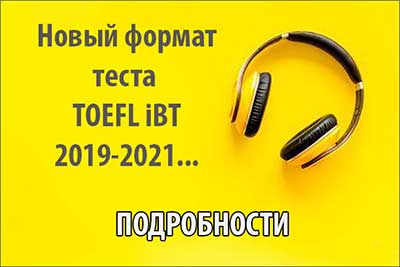Почему ETS решил перейти на iBT, и почему это особенно обеспокоило студентов-азиатов, рассказывается в нижеследующей статье.
NB: если вы понимаете основные идеи статьи, – значит, ваш уровень английского достаточен для того, чтобы начать подготовку к TOEFL iBT.
Most people for whom English is not their first language take the TOEFL exam as a prerequisite for admission into college and scholarship programs where English is used or required. After several years of research, the Educational Testing Services (ETS) has decided to reformat the TOEFL exam from a mostly multiple-choice test to a more inclusive evaluation of an individual’s reading, writing, listening and speaking skills and his or her ability to integrate these language proficiencies. According to ETS, the content on the TOEFL is “authentic” and the language is comparable with that which is used in a typical professional or academic environment. In a recent Associated Press interview, ETS Senior Vice-President Mari Pearlman explained the general practicality that the changes in the test will have. “In school, you are always using a combination of skills,” said Pearlman. “When you read, you take notes. When you’re in a classroom, you’re also speaking and writing. Students need all three skills outside the classroom, too, whether it’s finding housing or figuring out the washing machine.” A similar response echoes among others within the academic community. Fred Davidson, Associate Professor of English as an International Language at the University of Illinois at Urbana-Champaign concurred, saying “the integration of skills provides a real-world foundation from which score users can make admissions decisions with more certainty and clarity.”
However, such praise for these exam alterations has also been met with criticism from the international community. In particular, Asian students have spoken out with concerns about the new TOEFL. In Asia, schools that teach the English language generally focus on grammar and vocabulary in the classroom rather than oral communication. Therefore, students worry that this will be cause for poor performance on the new test, thereby jeopardizing their chances of admittance to universities such as Georgetown, which has a large international student presence. Источник: thegeorgetownindependent.com
Joonho Lee, (SFS ’07) a native of South Korea, agreed with these sentiments. “Asian students, including myself, used to take advantage of the reading and grammar sections, which are undoubtedly considered far easier than writing or speaking,” Lee said. However, Lee was not quick to dismiss the new exam, for he noted the future benefits of the changes, especially the oral testing section. “The new TOEFL test would evaluate students’ English skills much more accurately. Those who get high scores on [the old TOEFL test] later turn out to be poor at communicating with Americans because of the lack of practicing speaking skills which was not required for the test.”
Despite the opposing sides, however, Pearlman of ETS maintains that although students from particular countries where grammar and vocabulary is the main focus in an English language class may be at a slight disadvantage, the new format of the TOEFL should not remain an issue for very long. Comparable to the situation of the newly formatted SAT I exam, it will take a few years for the student and academic community to adjust.
ETS is hopeful for the TOEFL’s future. After the test was reformatted in the 1970s and a writing section was added, a similar skeptical response echoed throughout the international community. However, the world adjusted to the change, and ETS is confident that the recent overhaul of the TOEFL will eventually be met with acceptance from international students aiming to study at universities in the US.


